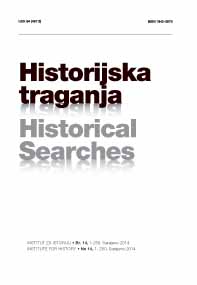Austrougarska trgovačka politika i obrazovanje: trgovačke škole u Bosni i Hercegovini (1878-1914)
Austro-Hungarian trade policy and education: Trade schools in Bosnia and Herzegovina (1878-1914)
Author(s): Amila KasumovićSubject(s): History
Published by: Institut za istoriju
Keywords: education; trade policy; trade schools; trade academy; Austrian-Hungarian period; Bosnia and Herzegovina
Summary/Abstract: The Austro-Hungarian administration in Bosnia and Herzegovina strived, and this was evident immediately after the executed occupation, to raise the economic life of the occupied area to a higher level than the one found. In the field of trade legislature, even though it was primarily decided to maintain the already existing Ottoman laws during the first years after the occupation, very soon significant moves were made in order to clearly define trade modalities. Along with the very vivid legislative activity, the Austro-Hungarian administration tended to improve the trade life of the occupied area also in other ways. With this aim, they initiated the opening of trade schools in the country. This trend started in the mid 1880-ies and was completed in the mid 1890-ies. The result of these activities was the establishment of ten trade schools in the country. Before the First World War, a Trade academy was opened in Sarajevo and an opening of the Trade academy in Mostar was planned. However, this practice has shown that the administration which encouraged the opening of trade schools in Bosnia and Herzegovina, compared to the rest of the Monarchy, where this was mainly done by economic circles, did not have, at least in the beginning, a clear vision neither about the direction that these schools should develop nor their status within the educational system and society in general. Therefore, the trade schools were twice reformed. In due time the Provincial government crystallized its standpoint that in the trade schools it should be insisted on teachings based on the two principles: general- education and professional-trade. The mentioned idea was opposed by the Common ministry of finances, but also by the teachers of the trade schools. The Provincial government considered that trade schools could produce traders but also a kind of a clerical staff whereas others insisted that first of all the trade schools had to focus on the profession. The idea of the Provincial government, if it was completely conducted, could have had far-reaching consequences and impact on the Bosnian-Herzegovinian society. It indicates that the Provincial government acted strategically with a clear idea of what the investment in the development of trade schools might result with. In the end, the solution was found in the establishment of trade academies which could and should have offered a good quality education. The beginning of the First World War stopped the activities of the administration in this field. Even though it is considered that the intention of the Provincial government to improve the trade of Bosnia and Herzegovina via trade schools was positive, the results of its activities were almost devastating: the majority of these schools made ends meet, but only centres such as Sarajevo and Mostar had a real need for such institutes.
Journal: Historijska traganja
- Issue Year: 2014
- Issue No: 14
- Page Range: 119-158
- Page Count: 40
- Language: Bosnian

